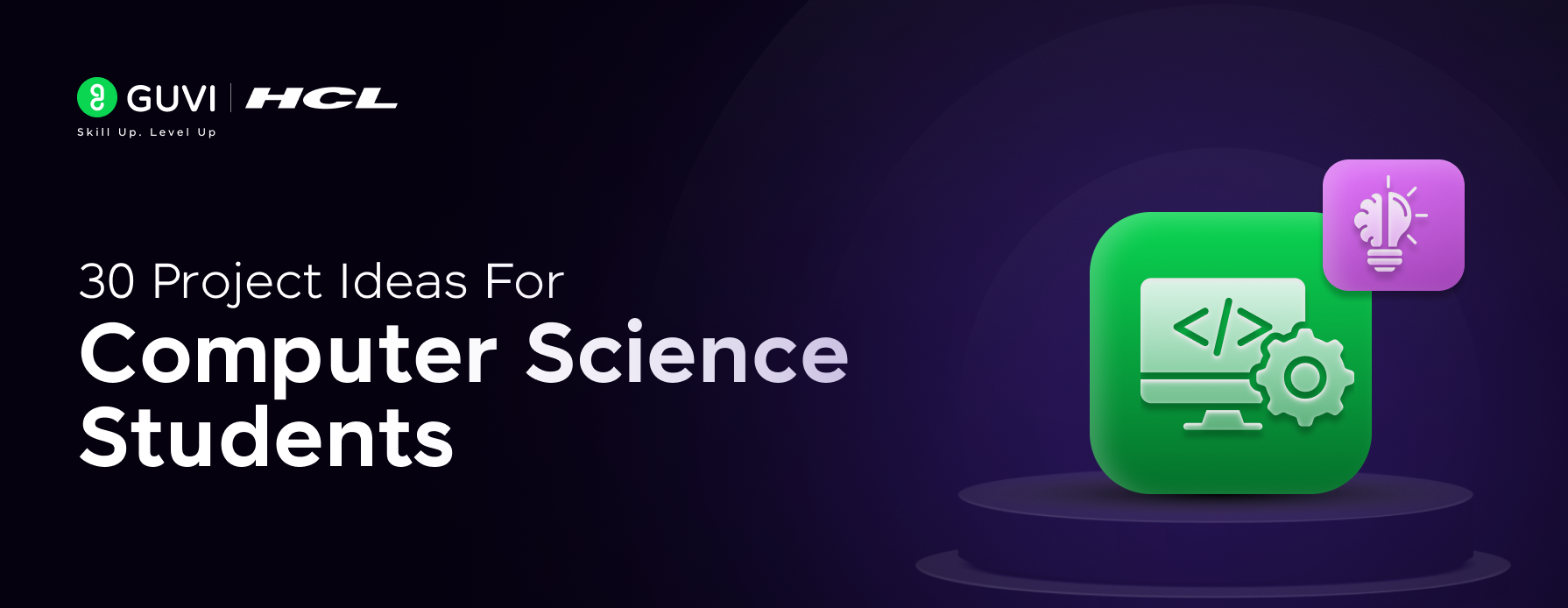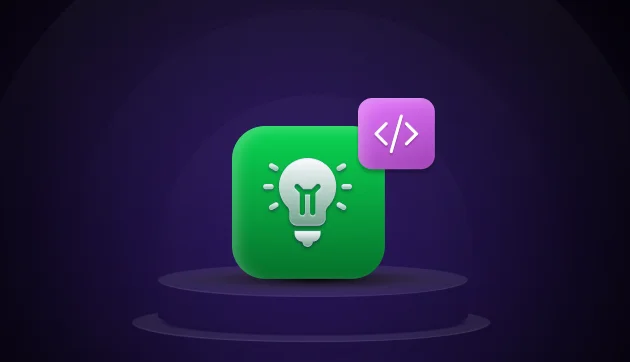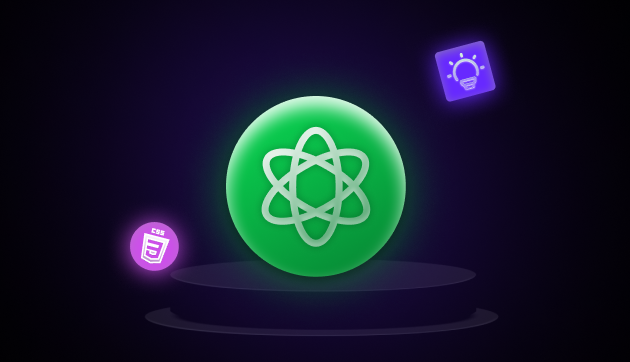![Top 9 Machine Learning Project Ideas For All Levels [with Source Code] 1 Post thumbnail](https://www.guvi.in/blog/wp-content/uploads/2024/01/Feature-image-Top-Machine-Learning-Project-Ideas-For-All-Levels-with-Source-Code.webp)
Top 9 Machine Learning Project Ideas For All Levels [with Source Code]
Mar 13, 2025 5 Min Read 12840 Views
(Last Updated)
Machine learning is a dynamic field that continues to shape the future of technology and innovation. From predictive analytics to AI-powered chatbots, machine learning projects have the power to solve real-world problems and unlock new potential.
In this article, we will explore 9 machine learning project ideas across different levels of expertise. These projects are carefully curated to cover a wide range of applications, from structured data analysis to image recognition and natural language processing.
By undertaking these projects, you can gain hands-on experience in applying theoretical knowledge to real-world problems, build a robust portfolio, foster problem-solving skills, and continuously expand your understanding of machine learning.
Table of contents
- Why Start a Machine Learning Project?
- How to Start a Machine Learning Project?
- Problem Definition
- Data Collection
- Data Preparation
- Model Selection and Training
- Model Evaluation
- Production
- Retrain and Monitor
- Machine Learning Projects for Beginners
- Predict Taxi Fares with Random Forests
- Predicting Credit Card Approvals
- Store Sales Analysis and Forecasting
- Classify Song Genres from Audio Data
- Intermediate Machine Learning Projects
- Find Movie Similarities from Plot Summaries
- Recognising Flower Species with Computer Vision
- Speech Emotion Recognition using Librosa
- Machine Learning Projects for Pros and Our Dear Final-Year Students
- ASL Recognition with Deep Learning
- Stock Market Analysis and Forecasting Using Deep Learning
- Concluding Thoughts...
- What are some interesting machine learning projects?
- Is ML easy to learn?
- Does ML require coding?
- Is ChatGPT just machine learning?
Why Start a Machine Learning Project?
I mean you gotta have a set goal right? So let’s discuss the whys before diving into the actual project deets. Undertaking machine learning projects offers a comprehensive learning experience across diverse domains and technologies.
These projects bridge the gap between theory and practice, allowing you to enhance essential machine-learning skills and build a robust portfolio that showcases your expertise.
Here are some key benefits of starting a machine learning project:
- Practical Experience: Undertaking machine learning projects provides hands-on experience in applying theoretical knowledge to real-world problems. By working on real datasets and implementing machine learning algorithms, you can enhance your understanding of data processing, model evaluation, and other essential skills.
- Portfolio Building: Completing machine learning projects allows you to create a robust portfolio that showcases your skills and knowledge. A well-crafted portfolio can significantly enhance your employability in this competitive field and increase your chances of landing exciting job opportunities.
- Problem Solving: Machine learning projects foster innovative problem-solving and critical thinking skills. By tackling real-world challenges, you can develop a deeper understanding of machine learning functionalities and gain insights into how to approach and solve complex problems.
- Continuous Learning: The diverse nature of machine learning projects promotes exploration and continuous learning within various domains of machine learning. As you work on different projects, you will gain exposure to various techniques, algorithms, and technologies, allowing you to expand your knowledge and skills continuously.
Now that we understand the benefits of starting a machine learning project, let’s learn what exactly are the steps of successfully pulling off a great project!
Make sure you understand machine learning fundamentals like Python, SQL, deep learning, data cleaning, and cloud services before we explore them in the next section. You should consider joining GUVI’s Machine Learning & Artificial Intelligence Course, which covers tools like Pyspark API, Natural Language Processing, and many more and helps you get hands-on experience by building real-time projects.
Also, if you want to explore Python through a Self-paced course, try GUVI’s Python course.
Must Read: Top 5 Product-Based Companies for Machine Learning Engineers
How to Start a Machine Learning Project?
Starting a machine learning project can be an exciting and rewarding endeavor. While there is no one-size-fits-all approach, here are some general steps to help you get started:
1. Problem Definition
Understand the business problem you want to solve and how machine learning can help. Research existing solutions, open-source projects, and research papers to gain insights into similar applications.
2. Data Collection
Collect relevant data from various sources, making sure it is of high quality and suitable for your problem. Clean and label the data, and create scripts for data validation to ensure its accuracy and consistency.
3. Data Preparation
Prepare the data for analysis by filling in missing values, cleaning and processing the data, and transforming it for machine learning algorithms. Use visualization tools to explore the data and understand its distribution and relationships.
Also Read: Real-World Machine Learning Applications
4. Model Selection and Training
Select suitable machine learning algorithms or deep learning architectures based on your problem and data. Train the models using appropriate techniques such as cross-validation and hyperparameter optimization to achieve optimal results.
5. Model Evaluation
Evaluate the performance of your models using appropriate evaluation metrics. Consider metrics such as accuracy, precision, recall, F1-score, and area under the curve (AUC) depending on your problem. Visualize feature importance to identify the most influential factors in your models.
6. Production
Once you have achieved satisfactory results, it’s time to deploy your machine-learning models into production. Implement MLOps practices such as continuous integration and deployment to ensure smooth and automated deployment processes.
7. Retrain and Monitor
Regularly monitor the performance of your deployed models and retrain them if necessary. Models can degrade over time due to data drift and concept drift. Retraining with new data helps your models adapt to real-time changes and maintain their performance.
Remember, machine learning projects are iterative processes. You may need to revisit and refine each step throughout the project to improve the performance of your models and achieve better results.
Find Out About Machine Learning Vs Deep Learning: A Layman’s Guide to AI in Easy Words
Machine Learning Projects for Beginners
- These beginner machine-learning projects are designed for individuals who are new to machine learning.
- These projects primarily focus on working with structured, tabular data and involve applying data cleaning, processing, and visualization techniques.
- The scikit-learn framework is commonly used to train and validate machine learning models in these projects. If you want to learn the basic concepts of machine learning first, consider taking an introductory course.
1. Predict Taxi Fares with Random Forests
In this project, you will predict the location and time to earn the biggest fare using the New York taxi dataset. You will most likely use the tidy-verse package for data processing and visualization.
To predict location and time, you will experiment with tree-based models such as Decision Trees and Random Forests. You can replicate the results on a different dataset to enhance your problem-solving skills.
Follow along with this GitHub repository to accomplish this one, but do try to put in your changes and tweaks along the way!
2. Predicting Credit Card Approvals
In this project, you will have to build an automatic credit card approval application using hyperparameter optimization and Logistic Regression.
You will handle missing values, process categorical features, perform feature scaling, deal with unbalanced data, and perform automatic hyperparameter optimization using GridCV.
This project will push you out of your comfort zone and help you develop skills in handling complex and real-world datasets.
Also Read: Machine Learning Engineer Resume Guide: 11 Important Things To Include!
3. Store Sales Analysis and Forecasting
In this Kaggle-based project, you will be provided with store sales data and train various time series models to improve your score on the leaderboard.
You will clean the data, perform extensive time series analysis, feature scaling, and train a multivariate time series model. To improve your score, you can use ensembling techniques such as Bagging and Voting Regressors.
You can also explore other datasets, such as the Stock Exchange dataset, to improve your understanding of time series forecasting. Find a similar GitHub project here.
4. Classify Song Genres from Audio Data
In this project, you will use a song dataset to classify songs into two categories: ‘Hip-Hop’ and ‘Rock.’ You will check the correlation between features, normalize the data mostly using Scikit-learn’s StandardScaler, apply Principal Component Analysis (PCA) on scaled data, and visualize the results.
After that, you will train and validate the results using Logistic Regression and Decision Tree models. This guided project will also introduce you to advanced techniques such as class balancing and cross-validation. Find a similar GitHub repo here.
Intermediate Machine Learning Projects
- These intermediate machine-learning projects focus on data processing and training models for structured and unstructured datasets.
- These projects will help you further develop your skills in data cleaning, processing, feature engineering, and statistical analysis.
- Additionally, you will learn how to train models using machine learning frameworks such as sci-kit-learn and perform model evaluation.
5. Find Movie Similarities from Plot Summaries
In this project, you will use Natural Language Processing (NLP) and KMeans clustering to predict the similarity between movies based on their plots from IMDB and Wikipedia (this project is similar to a movie recommendation engine).
You will combine the data, perform tokenization and stemming on text, transform it using TfidfVectorizer, create clusters using the KMeans algorithm, and plot the dendrogram.
You can replicate the results on a different dataset, such as the Netflix Movie dataset, to explore the similarity between movies. Explore this project Find Movie Similarities from Plot Summaries.
Also Read: Best Natural Language Processing (NLP) Books to Read in 2024
6. Recognising Flower Species with Computer Vision
In this project, you will process images and train a system that predicts the label/class of the flower/plant using Computer Vision techniques and Machine Learning algorithms.
You will manipulate and process the images, extract features, use Feature extraction using Deep Convolutional Neural Networks to prepare the data for the model, and then classify the flowers to get the results.
This project will introduce you to image classification and feature extraction techniques using machine learning.
7. Speech Emotion Recognition using Librosa
In this project, you will process sound files using Librosa, sound file, and Scikit-learn to recognize emotions from sound files.
You will load and process sound files, perform feature extraction, and train a Multi-Layer Perceptron (MLP) classifier model.
This project will help you understand the basics of audio processing and introduce you to speech-emotion recognition using machine learning.
Machine Learning Projects for Pros and Our Dear Final-Year Students
- These advanced machine-learning projects focus on building and training deep-learning models and processing unstructured datasets.
- You will work with convolutional neural networks, recurrent neural networks, and other advanced architectures. These projects will help you develop skills in training complex models and working with large-scale datasets.
8. ASL Recognition with Deep Learning
In this project, you will use Keras to build a Convolutional Neural Network (CNN) for American Sign Language (ASL) image classification.
You will visualize the images, analyze the data, process it for modeling, compile, train, and evaluate the CNN on the image dataset.
This project will help you understand image classification using deep learning and introduce you to the ASL recognition domain.
Also Explore: Top 7 Must-Know Machine Learning Tools
9. Stock Market Analysis and Forecasting Using Deep Learning
In this project, you will use Gated Recurrent Units (GRUs) to build deep learning forecasting models for predicting stock prices of companies such as Amazon, IBM, and Microsoft.
You will explore time series analysis, analyze trends and seasonality in stock prices, process the data, and build a GRU model using PyTorch.
This project will introduce you to time series forecasting using deep learning and help you better understand the dynamics of stock markets.
Concluding Thoughts…
Machine learning projects offer a wealth of opportunities for individuals at all levels of expertise. By undertaking machine learning projects, you can enhance your skills in data processing, feature engineering, model training, and deployment.
You will gain valuable experience in working with real-world datasets, implementing cutting-edge algorithms, and solving complex problems.
Also Read: Machine Learning Must-Knows: Reliable Models and Techniques
Kickstart your Machine Learning journey by enrolling in GUVI’s Machine Learning & Artificial Intelligence Course where you will master technologies like MatplotLib, pandas, SQL, NLP, and deep learning, and build interesting real-life UI/UX projects.
Alternatively, if you want to explore Python through a Self-paced course, try GUVI’s Pythoncertification course with IIT-M Certification.
Interesting machine-learning projects include image recognition, natural language processing, and recommendation systems. Read the article above to find actual project descriptions in all these fields and many more.
Learning machine learning (ML) can be challenging, but with dedication and resources, it is feasible for individuals with diverse backgrounds. Especially with GUVI’s extensive course resources.
Yes, machine learning often requires coding skills, as programming is essential for implementing algorithms and working with ML frameworks.
Not just but pretty much! ChatGPT is based on machine learning, specifically the GPT-3.5 architecture developed by OpenAI, which uses deep neural networks to generate human-like text.
























![How to Make Amazing Projects for Internships and Placements? [2025] 4 projects for internships and placements](https://www.guvi.in/blog/wp-content/uploads/2024/04/Feature-Image-2.png)




![Top Electrical Project Ideas for Engineering Students [2025] 6 Top Electrical Project Ideas](https://www.guvi.in/blog/wp-content/uploads/2024/05/1_feature.webp)

Did you enjoy this article?